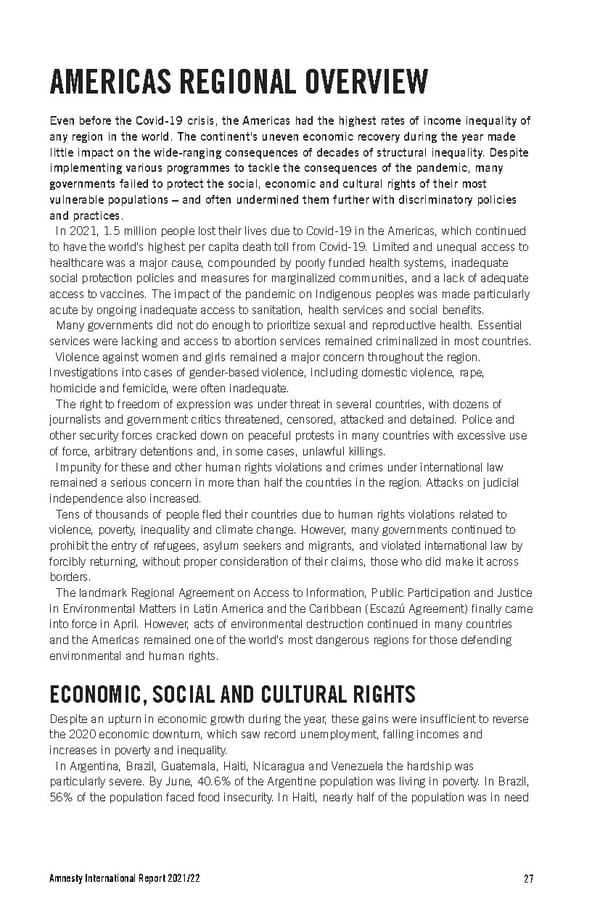AMERICAS REGIONAL OVERVIEW Even before the Covid-19 crisis, the Americas had the highest rates of income inequality of any region in the world. The continent’s uneven economic recovery during the year made little impact on the wide-ranging consequences of decades of structural inequality. Despite implementing various programmes to tackle the consequences of the pandemic, many governments failed to protect the social, economic and cultural rights of their most vulnerable populations – and often undermined them further with discriminatory policies and practices. In 2021, 1.5 million people lost their lives due to Covid-19 in the Americas, which continued to have the world’s highest per capita death toll from Covid-19. Limited and unequal access to healthcare was a major cause, compounded by poorly funded health systems, inadequate social protection policies and measures for marginalized communities, and a lack of adequate access to vaccines. The impact of the pandemic on Indigenous peoples was made particularly acute by ongoing inadequate access to sanitation, health services and social benefits. Many governments did not do enough to prioritize sexual and reproductive health. Essential services were lacking and access to abortion services remained criminalized in most countries. Violence against women and girls remained a major concern throughout the region. Investigations into cases of gender-based violence, including domestic violence, rape, homicide and femicide, were often inadequate. The right to freedom of expression was under threat in several countries, with dozens of journalists and government critics threatened, censored, attacked and detained. Police and other security forces cracked down on peaceful protests in many countries with excessive use of force, arbitrary detentions and, in some cases, unlawful killings. Impunity for these and other human rights violations and crimes under international law remained a serious concern in more than half the countries in the region. Attacks on judicial independence also increased. Tens of thousands of people fled their countries due to human rights violations related to violence, poverty, inequality and climate change. However, many governments continued to prohibit the entry of refugees, asylum seekers and migrants, and violated international law by forcibly returning, without proper consideration of their claims, those who did make it across borders. The landmark Regional Agreement on Access to Information, Public Participation and Justice in Environmental Matters in Latin America and the Caribbean (Escazú Agreement) finally came into force in April. However, acts of environmental destruction continued in many countries and the Americas remained one of the world’s most dangerous regions for those defending environmental and human rights. ECONOMIC, SOCIAL AND CULTURAL RIGHTS Despite an upturn in economic growth during the year, these gains were insufficient to reverse the 2020 economic downturn, which saw record unemployment, falling incomes and increases in poverty and inequality. In Argentina, Brazil, Guatemala, Haiti, Nicaragua and Venezuela the hardship was particularly severe. By June, 40.6% of the Argentine population was living in poverty. In Brazil, 56% of the population faced food insecurity. In Haiti, nearly half of the population was in need Amnesty International Report 2021/22 27
 Amnesty International Report 2021/22 Page 26 Page 28
Amnesty International Report 2021/22 Page 26 Page 28